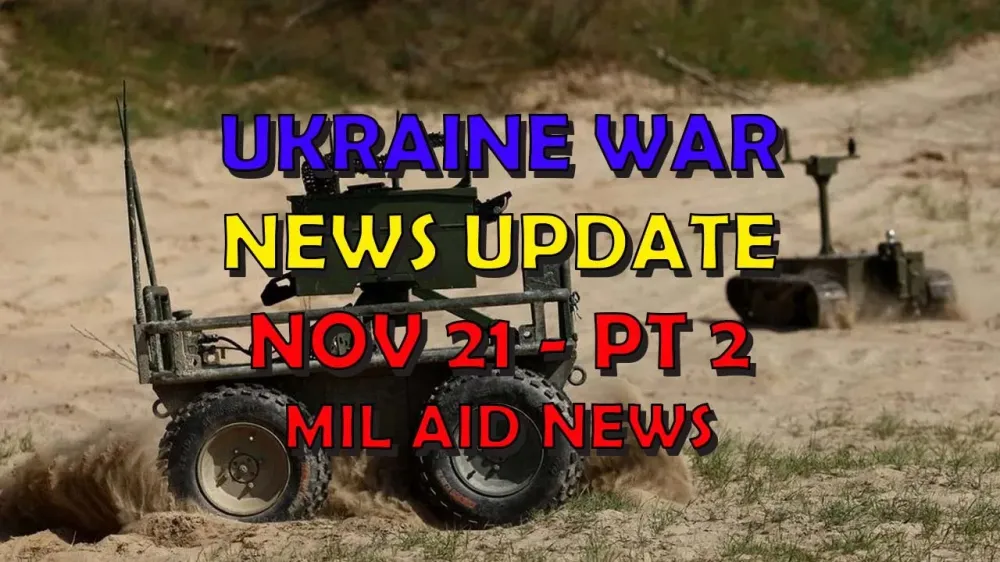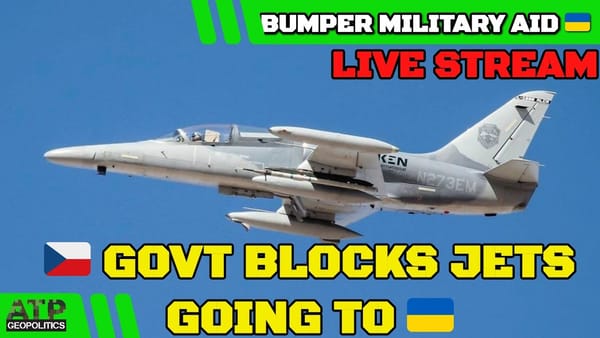Ukraine War Update NEWS: Military Aid News
🤖
This summary has been produced automatically by an AI Large Language Model (LLM) without any human intervention. Whilst every effort has been made to prompt the LLM to produce accurate output, there may be inconsistencies, inaccuracies or hallucinations!
Table of Contents 📖
"The point being that actually, this is really small fry. And the fact that they are shouting about that, I think, shows how little that happens."
Hello Team
🎦 00:00-00:09⏩
Jonathan welcomes viewers to another ATPG geopolitics video and reminds them there is a second part to today's update on the 21st of November 2024.
Return to top⤴️
USA pledges $275m military aid package to Ukraine
🎦 00:09-01:15⏩
- The US has pledged a new military aid package for Ukraine valued at $275 million.
- The package includes a standard array of ammunition and equipment, including:
- Ammunition for HIMARS systems (potentially including ATACMS, which would be significant).
- 155mm and 105mm artillery ammunition.
- 60mm and 81mm mortar rounds.
- Unmanned aerial systems.
- Missiles for TOW launchers mounted on Bradley vehicles.
- Javelin and 84mm anti-armor systems.
- Small arms and ammunition.
- Demolition equipment and munitions.
- Chemical, biological, radiological, and nuclear protective equipment.
- Spare parts, ancillary equipment, services, training, and transportation.
USA requests Congress cancels $4.65 Billion of Ukrainian Debt
🎦 01:15-02:12⏩
- Although the announced US aid package does not include anti-personnel mines, Jonathan notes separate reports suggesting their provision.
- Matthew Miller's announcement that the Biden administration has requested Congress to cancel $4.65 billion of Ukraine's debt is a significant development.
- Jonathan points out that while not direct funding, it equates to freeing up Ukrainian resources for other expenditures.
- This cancellation represents half of a conditional revolving loan provided to Kyiv, with the potential for the remaining balance to be voided in January 2026, potentially under a Trump administration.
- Jonathan expresses doubt about the likelihood of Congressional approval.
USA confirms provision of Anti-Personnel Mines to Ukraine
🎦 02:12-02:42⏩
- US Defence Secretary Lloyd Austin has confirmed the US decision to supply anti-personnel mines to Ukraine.
- Austin justifies this decision by citing changes in Russian front-line tactics that necessitate such weaponry.
- Jonathan highlights concerns regarding the potential threat these mines pose to civilians.
- Ukraine has assured the international community that it will meticulously document the deployment locations of these mines.
- Jonathan expresses his assumption that a comprehensive database of Ukrainian ordnance placement along the front lines is maintained.
Canada commits $545 Million in Military Aid to Ukraine in 2025 Draft Budget
🎦 02:42-03:01⏩
- Canada's draft budget for 2025 includes US $545 million allocated for military assistance to Ukraine.
- Defence Minister Bill Blair emphasised Canada's steadfast support for Ukraine, acknowledging the immense sacrifices Ukrainians are enduring in the face of Russian aggression.
Canada to deliver NASAMS Air Defence System to Ukraine
🎦 03:01-03:31⏩
- Canada is set to deliver the NASAMS air defence system to Ukraine. The system was purchased for Ukraine some time ago, but its delivery was delayed.
- Although Canada attributed the delays to the US, Colby Badwad suggested procuring an alternative system instead of waiting for the NASAMS.
- The NASAMS system is currently in Poland and will soon be transferred to Ukraine.
Italy allocates €200 Million to rebuild Ukrainian electricity network
🎦 03:31-03:46⏩
- Italy has pledged €200 million to aid in the restoration of Ukraine's electricity grid, severely damaged by Russian attacks.
- Italian Minister of Foreign Affairs and International Cooperation, Antonio Tajani, announced this commitment.
Switzerland provides energy-efficient pumps to Odesa
🎦 03:46-04:22⏩
- Switzerland has provided four energy-efficient pumps to Ukraine to support Odesa's heating supply, which is under strain due to Russian attacks on the Ukrainian energy grid.
- Jonathan argues that while Switzerland refrains from providing military aid, its contributions to humanitarian assistance and infrastructure support are equally valuable.
- He suggests a division of responsibility among supporting nations, where those uncomfortable with military contributions can focus on areas like humanitarian aid, infrastructure, and energy.
- Jonathan highlights the UK's focus on supplying weapons systems that other countries are hesitant to provide.
Netherlands delivers final F-16 fighter jets to Romania for Ukrainian training
🎦 04:22-04:55⏩
- The Netherlands has fulfilled its pledge of delivering 18 F-16 fighter jets to a training centre in Romania. The final two aircraft have been sent.
- Ukrainian pilots and personnel will undergo training on these aircraft at the facility in Fatesti, Romania, bolstering Ukraine's defence capabilities.
- Jonathan welcomes the news, noting that the Ukrainian army can now fully utilise the Dutch F-16s for training purposes within Ukraine.
Ukraine establishes training school for unmanned ground vehicle (UGV) operators
🎦 04:55-05:10⏩
- The Ukrainian Armed Forces have established their first training school dedicated to unmanned ground vehicle (UGV) operation.
- Soldiers are receiving training on approximately 10 different robotic systems, encompassing logistics, special operations, and engineering applications.
Russia notes Ukrainian infantry brigades are being up-equipped to mechanized brigades
🎦 05:10-07:20⏩
- Citing a Russian source, War Translator, Jonathan reports that Russian channels are buzzing with discussions regarding the equipping of newly formed Ukrainian brigades with heavy weaponry previously unavailable to them.
- This contradicts Zelensky's recent assertion that Ukraine possesses sufficient weapons.
- Despite claims of adequate weaponry, sources suggest a considerable number of trained Ukrainian brigades are awaiting equipment.
- Jonathan points out that the discussion revolves around converting existing infantry brigades into mechanised brigades by supplying them with the necessary equipment.
- He cites reports from both Ukrainian and Russian sources about the ongoing restructuring of Ukrainian brigades (specifically those numbered in the 150s) from infantry to mechanised units, indicating a significant influx of heavy armoured vehicles and weaponry provided by Western allies.
- This aligns with recent observations of military equipment, including around 20 Bradley fighting vehicles, in Romania, likely destined for these brigades.
UK to decommission warships and aircraft to cut costs
🎦 07:20-08:19⏩
- Jonathan shifts focus to the UK, addressing a widely reported story about the country's decision to decommission five warships, dozens of military helicopters, and a fleet of drones to reduce defence spending.
- Sky News reported that Shadow Defence Secretary John Healey announced this measure in Parliament, projecting savings of up to £500 billion over the next five years.
- The decision will see the Royal Navy's two amphibious assault ships, HMS Albion and HMS Bulwark, retired a decade ahead of schedule, significantly impacting the Royal Marines' ability to conduct seaborne assaults.
- Also slated for early retirement are 17 Royal Air Force Puma helicopters and 14 of the military's oldest Chinook helicopters, alongside 46 Watchkeeper drones.
Jonathan discusses the UK's difficult decision and the need to prioritise resources
🎦 08:19-13:56⏩
- Jonathan acknowledges the public outcry over the UK government's decision, with many questioning the wisdom of scaling back military capabilities.
- He provides counterpoints to the criticism, highlighting the concept of the "sunk cost fallacy," which suggests that continuously investing in failing or outdated assets is unwise.
- Jonathan argues that while reinvesting in the armed forces is desirable, the current economic climate and the urgency of supporting Ukraine necessitate difficult decisions.
- He points out that the UK, like many other nations, faces tough choices in balancing a finite budget with competing demands such as healthcare, education, domestic armed forces, and supporting Ukraine.
- Jonathan cites an analysis by a former naval officer, Tom Sharp, who, while critical of the timing of the announcement, acknowledged the longstanding issue of military underfunding since the end of the Cold War.
- He emphasizes this is not a partisan issue but a systemic challenge faced by successive governments.
- Jonathan questions whether retaining outdated or less-effective equipment like the Watchkeeper drones, given the lessons learned from the Ukraine conflict, is a prudent use of resources.
- He reiterates that while ideally, unlimited resources would be available, the reality is that difficult choices must be made, and he challenges critics to offer alternative solutions given the current financial constraints.
Czechs and Slovaks send financial aid to Russia
🎦 13:56-16:26⏩
- In a shift of focus, Jonathan cites War Translated's Dmitry, who reported that some Slovak and Czech citizens, including expatriates, had raised and donated €50,000 to residents of Russia's Kursk region affected by the ongoing conflict.
- He expresses surprise at this, noting the stark contrast in the volume of charitable aid flowing from around the world into Ukraine compared to Russia.
- Jonathan highlights the irony of Russian state television emphasizing this relatively small donation while significant fundraising efforts in support of Ukraine, like those conducted by his channel's audience, go unreported by mainstream media.
- Jonathan reveals that his viewers, in collaboration with individuals like Greg Terry, Prof Gerdes, and Rick the Ukrainian, have raised nearly $200,000 for Ukraine, far exceeding the sum highlighted by Russian media.
- He sees this discrepancy as telling evidence of the disparity in public support for Ukraine and Russia.
Uncertainty surrounding Russian missile stockpile
🎦 16:26-17:41⏩
- Citing a source, Warmont, Jonathan mentions an unverified claim that the Russian military has amassed a stockpile of over 1,500 missiles.
- While expressing uncertainty about the claim's validity, Jonathan expresses interest in understanding Russia's actual missile production capacity, the size of their current stockpile, and the potential for future large-scale missile attacks similar to the recent barrage.
- He contrasts the recent attack's limited effectiveness with Ukraine's potential to employ its own domestically produced Neptune missiles.
- Jonathan ponders Ukraine's current Neptune missile inventory, considering whether they are being held in reserve for a larger offensive or employed in targeted strikes against Russian assets, which may not be publicly acknowledged.
Wrap up
🎦 17:41-17:57⏩
- Jonathan concludes the video by expressing his appreciation for the audience's support.
- He informs viewers that the next geopolitics update will be delayed due to a prior commitment.
🤖❓ AI Debrief (post task) - anything the AI didn't understand
Colby Badwad: I am unfamiliar with this individual and their expertise. It would be helpful to have some context.
War Translated's Dmitry: Is this referring to a specific individual who works with War Translated, or is it a general reference to the organisation's reporting? Clarification on Dmitry's role and expertise would be beneficial.
Warmont: This source is unfamiliar. Could you provide more information about this entity and its reliability?
🤖💭 AI Plan (pre task) - the AI's step by step thought process
I need to approach this task methodically to ensure accuracy and clarity in the summary. I will follow the steps outlined as follows:
Video Information Extraction: I'll begin by carefully extracting the title, date, and part of the video from the provided YouTube title, ensuring the date format adheres to UK conventions (DD/MM/YYYY).
Topic Segmentation: I will listen to the video or meticulously read the transcript, identifying distinct topics within Jonathan's discourse. I will create concise and descriptive titles for each topic, using specific details and quantifiable information where available. Granularity is key, so I will aim to separate topics by country, category, region, or specific news item.
Timestamp Mapping: For each identified topic, I will note the corresponding start and end timestamps from the transcript. I will double-check for any overlaps or gaps in the timestamps to ensure comprehensive coverage of the video's content.
Summary Generation: With the topics and their timeframes defined, I will summarise the key points for each section. I will strive to maintain Jonathan's voice and perspective, including his insights, analyses, and opinions. Clarity and conciseness are crucial, using bullet points and formatting for readability. I will also ensure any mentioned sources or individuals are correctly credited.
Quote Selection: I will choose a compelling quote from the transcript that reflects the video's essence. The quote should be impactful and understandable even when taken out of context.
Query Documentation: Finally, I will honestly record any uncertainties encountered during the process. This includes unfamiliar terms, ambiguous statements, or any information requiring further clarification.



